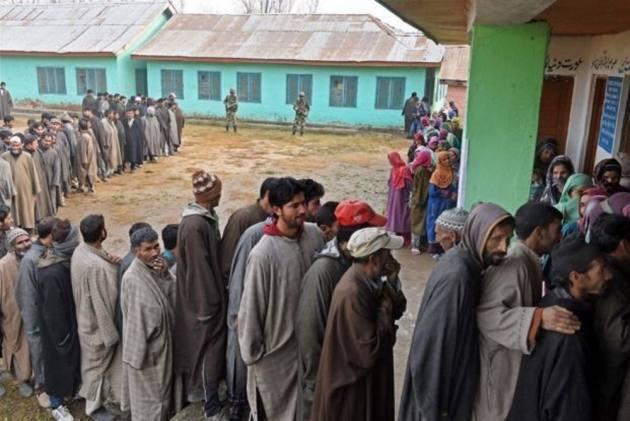Implementation of the 74th CAA in Kashmir Just a Hoodwink

The Centre has exhumed the 74th Constitutional Amendment Act (CAA) and is talking about implementing it in Jammu and Kashmir (J&K). The hullaballoo generated by the Bharatiya Janata Party (BJP) government belies its real intentions; which is to create fissures in the state’s political realm.
Realising that the people of Kashmir have vociferously opposed the abrogation of their special status, the BJP is attempting to win over one set of stakeholders—the local body representatives of the Valley. Yet, the government is concealing one important fact: the people it has placed under detention include elected local body representatives.
The 74th constitutional amendment pertains to local governance in cities and towns. Its crux is that elections to city bodies must be held at regular intervals of five years. Its other aim is to transfer some important functions of governance to cities. To put it in context, the elected representatives of J&K are being told that the provisions of democratic decentralisation, that the 73rd and the 74th CAA represent will be easy after their status has been changed.
What is also being hidden is that the BJP has failed to woo mainstream political parties of Kashmir. All leaders and activists of the People’s Democratic Party, the National Conference, the J&K People’s Movement, the Awami Ittehad Party, the Communist Party of India (Marxist) and members of the bar, civil society, and others are under arrest or in detention since 5 August.
Not just that the BJP has been instrumental in diluting the provisions of the 74th Amendment. As urban specialists say, it has virtually written an obituary of the Act. After 25 years of its promulgation the 73rd and 74th amendments have cities screaming for proper implementation.
Article 243 of the Constitution makes direct elections mandatory for all seats in a municipal council. Article 243-K and 243-Z(a)entrusts State Election Commissions with the supervision of municipal elections.
There are over 8,000 urban agglomerations and over 5,000 urban local bodies in India. There is no universalisation of their functions. Many states have not adhered to either of these mandatory provisions, which weakens their political empowerment. Take for instance Visakhapatnam and Chennai, where municipal elections have not been held since 2011 and 2006 respectively. In spirit, the 74th CAA sought to empower elected institutions. Eighteen important subjects are to be transferred to city governments as well, which are mentioned in the 12th Schedule of the Constitution. These include land, planning, water, sanitation, planning for economic and social development, water supply, public health, urban forestry etc. But in reality solid waste management is the universal function of the city government while the rest are either managed by state government-run para-statals or private agencies.
This writer was part of the national task force formed in 2013, headed by K C Sivaramakrishnan, the former secretary of the Ministry of Urban Development, to review implementation of the 74th CAA. The review report, which is with the ministry of housing and urban development, is a scathing indictment of its poor implementation.
The worst form of attack on the elected governance plank of urban bodies come under the BJP’s rule, during its previous term that ran from 2014 to 2019.
Elected city governments in many states became just ornamental obligations, where mayors and other members of the city council were duly elected but beyond that municipal governance remains in the hands of the state government-appointed commissioner or executive officers. In Haryana (a BJP-run state government) the local bodies law even allows for removal of the Mayor from office on the advice of the Commissioner. Such is the state of weakening of city governance under the BJP.
The worst form of attack on city governance came in the unfolding of the smart city mission (SCM), which is supposed to be a lighthouse model of urban governance. The smart city plan conceives of special purpose vehicles or SPVs in cities as implementation bodies.
SPVs are a new model of urban governance advocated by the BJP which completely undermines the hierarchy of the elected council. SPVs are registered as private companies that are not answerable to the city Council. Neither the elected Mayor nor any Council Member chairs these SPVs.
SPVs therefore mark the transition of our city spaces from urban commons towards the privatisation of governance. Such a drive for privatisation is not just in engineering and executing projects—something that happens all over the country now—but represents a new narrative of urban governance.
This is what the people of J&K can expect too, when the BJP talks about implementing the 74thAmendment. Actually, J&K (as a state) already implements the J&K Municipal Act of 2000 with provisions similar to the 74th Amendment.
The J&K Municipal Act identifies three kinds of urban agglomerations: municipal corporations, councils and committees based on a town’s size and population.
The Act specifies the term of the elected members of the Councils at five years. In fact, this state Act is a replica of many laws adopted by different state governments in tune with the provisions of the 74th CAA.
So, it is a wonder why the Home Minister Amit Shah says the 74th CAA will be implemented in J&K: It is already being implemented in the same fashion as other states are doing so.
Srinagar city, too, is part of the Smart Cities bandwagon and implementing the same policies as other cities. Leh, the biggest city in Ladakh, was implementing the Urban Infrastructure Development Scheme for Small and Medium Towns or UIDSSMT scheme under the Jawaharlal Nehru National Urban Renewal Mission or JNNURM, a flagship programme of the Congress-led United Progressive Alliance governments that came to power twice, in 2004 and 2009.
The point is not to have an Act. It is to execute its provisions properly and to transfer power from the nominated state government officers to elected members. The question is, can this be expected from a party that has not just shrunk the state and turned it into two Union Territories, but thwarted its basic aspirations for democratic governance.
Get the latest reports & analysis with people's perspective on Protests, movements & deep analytical videos, discussions of the current affairs in your Telegram app. Subscribe to NewsClick's Telegram channel & get Real-Time updates on stories, as they get published on our website.
























